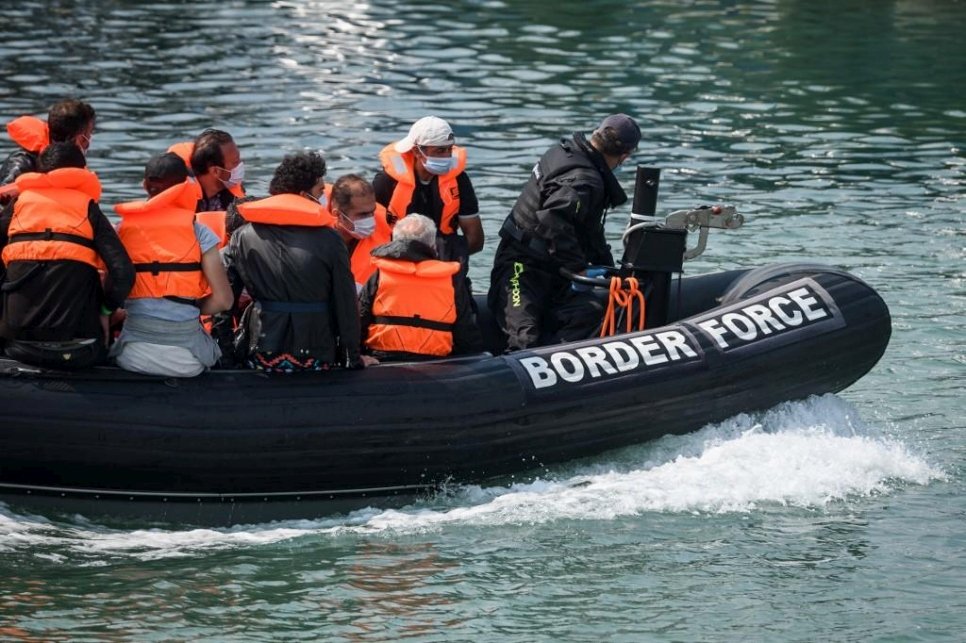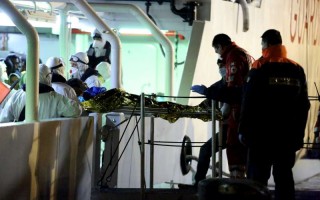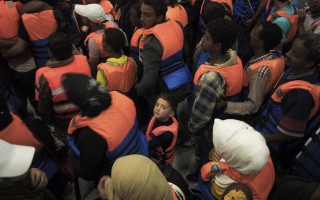
Refugees and migrants arrive in port aboard a Border Force vessel after being intercepted while crossing the English Channel from France in small boats on August 11, 2020 in Dover, England. © Leon Neal/Getty Images/AFP
UNHCR, the UN Refugee Agency, and the International Organization for Migration (IOM) are troubled by the proposal to intercept boats and return those attempting to cross the English Channel irregularly. The foreseen deployment of large naval vessels to deter such crossings and block small, flimsy dinghies may result in harmful and fatal incidents.
Although increasing numbers of people have been crossing the Channel by boat this summer, the numbers remain low and manageable. People forced by wars and persecution to flee their homes and people on the move frequently embark on risky journeys in many parts of the world. Saving lives should be the first priority – both on land and at sea. UNHCR and IOM reiterate their call to governments in Europe and elsewhere to increase search and rescue efforts and combat human smuggling and trafficking rings.
“Irregular movements in the Channel represent a challenge for all states concerned as do similar situations in other regions of Europe. These multi-faceted challenges require practical solutions and cooperation,” said Pascale Moreau, UNHCR Director for Europe. “Our collective response should be comprehensive and complementary – from saving lives to combating smuggling rings, expanding legal options, and ensuring that all those who are in need of protection can effectively access it.”
Solutions can be achieved for those in need of protection through the asylum system and complementary mechanisms for those in need of other forms of protection such as victims of trafficking and unaccompanied children. At the same time, impediments to return to countries of origin for those who wish to return and/or found not to be in need of international protection have to be consistently addressed, including through cooperation with these countries supported by the EU.
Effectively ensuring that asylum seekers and migrants are aware of their legal options and adequately supported in pursuing them needs to be a priority. Efforts should also be increased to identify and protect the most vulnerable, especially unaccompanied children.
This should go hand in hand with cooperation to ensure that people who have grounds for regular entry, including to reunify with their families, can do so quickly and effectively without having to resort to such a dangerous journey. UNHCR research shows that delays and administrative barriers to family reunion increase the likelihood of people turning to smugglers as an alternative. Less restrictive and burdensome family reunion rules are therefore needed.
“The immediate concern is the dangers the crossings present particularly to the most vulnerable, including many children,” said Ola Henrikson, Director of IOM’s Regional Office in Brussels. “Border cooperation is very important but should be balanced, proportionate and part of a larger, comprehensive response.”
In the wake of the UK’s departure from the European Union, viable mechanisms need to continue to ensure that people, and first and foremost unaccompanied children in various EU countries, who have family or other important links to the UK can continue to travel or transfer safely.
For more information, please contact:
UNHCR
- In Geneva, Shabia Mantoo, mantoo@unhcr.org +41 79 337 7650
- In the UK, Laura Padoan, padoan@unhcr.org +44777 5566127
- In France, Rachel Jenkins, jenkinsr@unhcr.org +33 (0)6 03 66 10 29
IOM
- In Geneva, Safa Msehli, smsehli@iom.int +41 79 403 5526,
- In Brussels, Ryan Schroeder rschroeder@iom.int + 32 492 25 02 34,
Originally published on UNHCR on 13 August 2020





